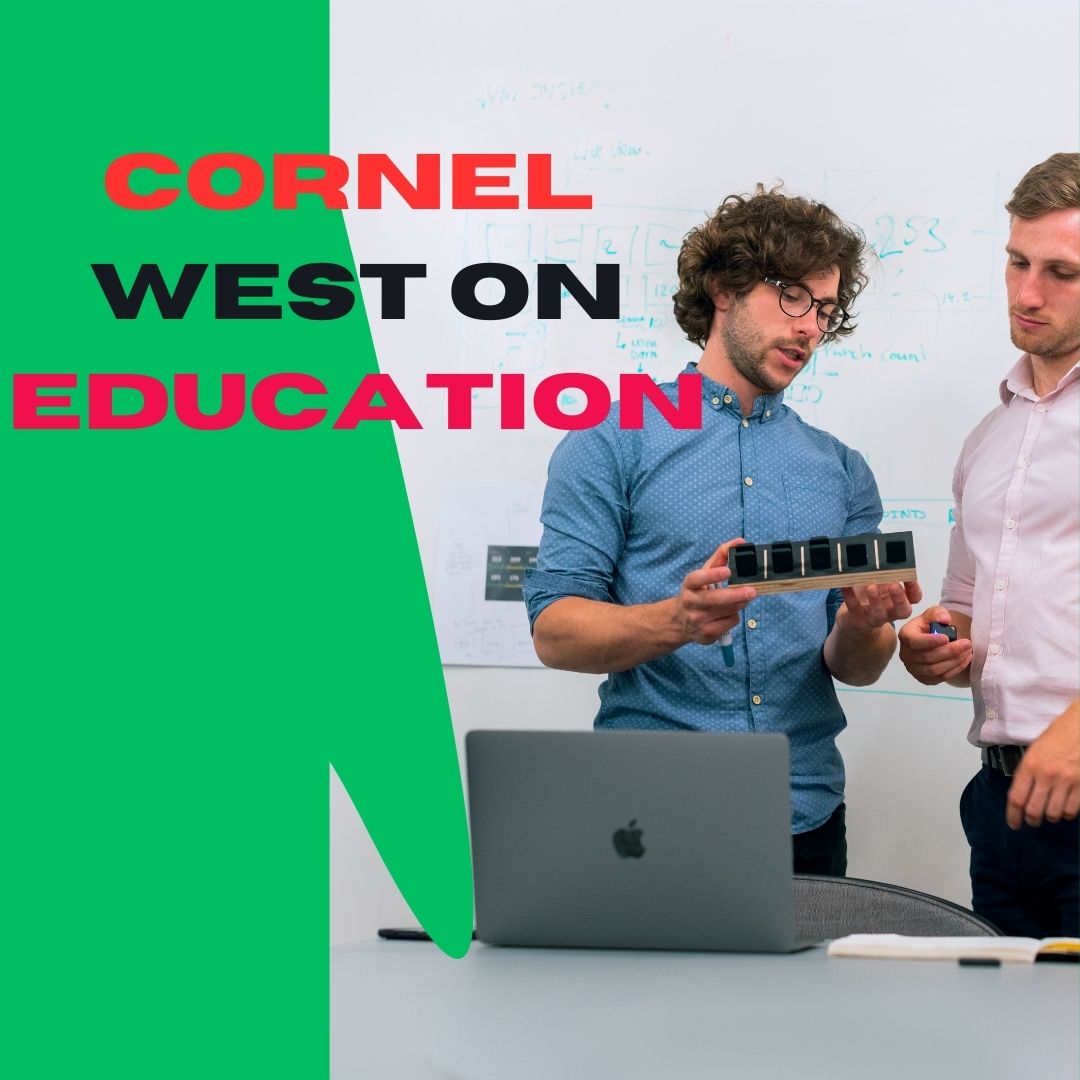Cornel West on Education: Better Igniting Minds & Debate
Cornel West is a prominent intellectual who advocates for a democratic and egalitarian approach to education. He emphasizes the value of education in empowering individuals and societies.
Renowned philosopher and academic Cornel West views education as a crucial force for social transformation and individual empowerment. His perspective integrates a blend of African American philosophy, the principles of the civil rights movement, and an unyielding critique of social injustices.
West’s work in education challenges the status quo and argues for a curriculum that is deeply reflective, critical of societal inequalities, and committed to fostering democratic ideals. He is a firm believer in the power of education to nurture critical thinkers and compassionate citizens who are equipped to engage in activism and change-making. With a career spanning several decades, Cornel West has consistently been a voice for a transformative education system that not only imparts knowledge but also instils a profound sense of social responsibility and justice in students.
You May Also Read: Business Management Courses Online
Cornel West’s Philosophy On Education
Cornel West’s philosophy on education dives deep into the essence of learning and growth. This philosophy offers a rich tapestry of ideas, emphasizing education’s power to transform individuals and societies. Let’s explore the components of Dr. West’s educational beliefs, which hinge on holistic development and fostering a critical mindset.
Holistic Growth And Critical Consciousness
Dr. West champions a kind of education that nurtures the whole person. He believes schooling should go beyond textbooks and expand into the realms of moral and spiritual growth. Dr. West insists on developing a ‘critical consciousness’ in students. He pushes for a learning environment where students challenge the status quo and question underlying assumptions. Aspects of this holistic approach include:
- Encouraging creative thinking and expression
- Building empathy and understanding among peers
- Promoting self-reflection and personal development
Through these elements, Dr. West sets the stage for a robust educational experience that fosters critical and creative minds ready to engage with the world’s complexities.
Education As A Vehicle For Change
For Dr. West, education is not just about individual growth. It is also a catalyst for societal transformation. He sees the classroom as a starting point for activism and advocacy. By building a foundation of knowledge and critical skills, education empowers students to make a positive impact. Key features of this transformative vision include:
- Learning to fight injustice and inequality
- Cultivating leadership and community involvement
This forward-thinking approach positions education as a tool for shaping a better future, not just for the learners but for society as a whole.
The Legacy Of Cornel West In Academia
Cornel West’s contribution to academia spreads far and wide. His influence touches upon various disciplines. He combines philosophy with civil rights advocacy. West is known for his strong stands, eloquent speeches, and engaging books. These have made him a household name in scholarly circles.
Tenure At Harvard And Princeton
Cornel West’s academic journey includes notable tenures. His time at both Harvard and Princeton universities stands out. At Princeton, West was appointed as Professor of Religion and Director of African American Studies. His classes were famed for challenging students to think critically. At Harvard, he held the position of Professor of the Practice of Public Philosophy. West’s impact in these roles stretched beyond the classroom. He inspired generations of students and academics alike. West’s departure from Harvard in 2021 made headlines, showing his powerful place in academic circles.
Influential Works And Lectures
- “Race Matters”: A book that delves deep into race, democracy, and philosophy.
- Democracy Matters: A powerful critique of the troubles facing American democracy.
West’s lectures, often hosted in packed auditoriums, are memorable experiences. He discusses social issues with passion and depth. His speeches often go viral, reaching audiences worldwide. The power to engage with such diverse groups is a testament to his scholarly legacy.
| Year | Title | Role |
|---|---|---|
| 1993 | Race Matters | Author |
| 2004 | Democracy Matters | Author |
Through his works and teachings, Cornel West leaves an indelible mark on education. His legacy will surely influence future thinkers and activists.
Pedagogy Of Empowerment
The ‘Pedagogy of Empowerment’ takes root in the belief that teaching is about more than delivering facts. It’s a heart-led journey encouraging students to find their voice. Dr. Cornel West, a prominent figure in education, epitomizes this approach. His lessons stretch beyond the confines of traditional schooling. They ignite a passion for learning and foster a sense of strength in students.
Teaching Beyond The Classroom
Dr. West advocates for a learning experience that transcends the conventional classroom walls. His approach underscores the importance of engaging with the world around us. His students learn to apply knowledge in real-life scenarios. This involves community service, social activism, and a drive to make an impact on society.
Encouraging Intellectual Curiosity
By promoting questions and exploration, Dr. West instills a deep-seated intellectual curiosity in his students. He believes that every child has the potential to become a powerful thinker. Engaging debates, thought-provoking questions, and interactive discussions are central to his teaching method. This style ensures that students not only absorb information but also learn to challenge it creatively.
- Fostering critical thinking by debating diverse viewpoints
- Creating a safe space for students to express their ideas
- Inspiring action through knowledge and understanding

Debates That Shaped Views
The ‘Debates that Shaped Views’ on Cornel West’s perspective demonstrate the dynamism of his thoughts on education.
These debates laid the foundation for a profound understanding of the roles of educators and scholars in society.
Public Intellectual Clashes
Cornel West, known for his bold presence, participates in critical exchanges that often spark national dialogue. His discussions extend beyond academic circles. They reach everyone interested in the aim and effect of education in America.
- Heated conversations on racial justice
- Diverse opinions on democracy in education
- Thought-provoking debates about class in society
These interactions play a significant role in shaping his views. They mold his educational theories.
Influence On Educational Policies
West’s discussions go beyond theories. They stress the practical application of ideas. His arguments about education often translate into policy suggestions. These policies impact the way learning communities function.
| Focus Area | Impactful Ideas |
|---|---|
| Curriculum Design | Integrated studies |
| Teaching Philosophy | Critical thinking emphasis |
| Policy Reform | Equal access initiatives |
Through his influential writings, West challenges educational leaders. He invites them to reconsider their strategies. This challenges the status quo in the educational landscapes.
Intersectionality In West’s Educational Views
Intersectionality in West’s Educational Views shapes our understanding of how education must address various forms of inequality. Cornel West champions a teaching approach that recognizes the complex dimensions of identity, like race, gender, and socioeconomic status. These aspects are not separate; they work together, impacting learners’ experiences. West believes recognizing these overlapping spaces is crucial for a just and fair education system.
Race And Class In The Classroom
In Cornel West’s educational philosophy, the classroom is not just a space for learning facts. It’s where society’s issues, like race and class, become visible. Teachers play a key role. They must understand every student’s background. This awareness helps in creating an inclusive learning environment.
- Encourage open discussions about race and socioeconomic realities.
- Build curriculum that reflects diverse histories and narratives.
- Maintain high expectations for all, despite varied resources at home.
Empathy As An Educational Tool
Empathy is a centerpiece in West’s vision for education. Solidarity with students helps in acknowledging their struggles. Teachers empower students when they use empathy. They also create a supportive space for personal growth.
- Teach with compassion and understanding for individual student needs.
- Use real-world issues to foster emotional intelligence in learners.
- Encourage peer-to-peer learning, building a community of mutual respect.

Dialogues For Understanding
Cornel West—a name synonymous with deep thought and progressive education. His ideas offer a transformative approach to learning, opening up dialogue for mutual understanding. At the core of his educational philosophy is the belief in engaging, powerful conversations. These dialogues bridge gaps and cultivate wisdom among individuals from diverse backgrounds.
Socratic Method In Modern Education
The Socratic Method, a cornerstone of West’s pedagogy, promotes questioning to stimulate critical thinking and illuminate ideas. This age-old approach remains relevant, even in the 21st century. How so? Let’s explore:
- Active engagement: Students are not passive listeners but active participants.
- Deep understanding: Through back-and-forth dialogue, complex concepts become clear.
- Self-reflection: Learners examine their own beliefs and values.
Facilitating Conversations Across Divides
Cornel West champions dialogues as bridges between differing viewpoints. Education, in his view, should serve as a melting pot for varied perspectives, fostering a shared sense of humanity. Here’s how conversations can cross divides:
| Strategy | Benefit |
|---|---|
| Storytelling | Builds empathy and understanding. |
| Active listening | Encourages respect and acknowledges different voices. |
| Common ground | Highlights shared values and objectives. |
Criticism And Controversy
The journey of Cornel West in the domain of education has sparked significant debate. Renowned for his poignant critiques and advocacy, West’s approach to education has not been without its detractors. Focusing on the ‘Criticism and Controversy’ surrounding his educational views, we delve into the heart of the debates that question his perspectives and methodologies.
Academic And Political Disagreements
Traversing the complex landscape of academic and political thought, West has encountered staunch opposition. Critics argue that his philosophies may sometimes overshadow practical educational outcomes. Others have expressed concerns about his political activism influencing his academic responsibilities. Discourse around his stance on education also overlaps with larger social and political issues, creating a multi-faceted array of disagreements.
| Type of Disagreement | Details |
|---|---|
| Educational Philosophy | Critics question the implementation of West’s theories in practical teaching. |
| Political Activism | Concerns arise about political activism impacting academic duties. |
| Social Issues | An alignment with broader socio-political controversies sparks debate. |
West’s Response To Educational Critique
In response to the criticism, Cornel West has remained firm and articulate in defending his educational philosophy. He emphasizes the significance of critical thinking and moral leadership in education. West champions a transformative approach to learning that marries academic rigor with societal engagement. He argues that education must not be insulated from the realities of the sociopolitical landscape it exists within.
- Advocacy for Critical Thinking: West sees this as vital to student development.
- Moral Leadership: He stresses education’s role in shaping leaders with integrity.
- Transformative Learning: West believes education should provoke change.
- Integration of Sociopolitical Aspects: He insists on connecting education to societal issues.
Cornel West’s Influences And Mentors
The intellectual journey of Cornel West is as inspiring as it is profound. His thoughts on education and social justice stem from a rich tapestry of influences and mentors. These figures have shaped his philosophy and teachings, making an indelible mark on his legacy. Let’s delve into the minds and moments that have sculpted Cornel West’s viewpoints.
Intellectual Ancestry
Cornel West’s intellectual roots are as deep as they are diverse. His thinking reflects a blend of historic wisdom and prophetic challenges. At this tree’s base lie some of history’s most formidable thinkers.
- Plato – pioneer of Western philosophy
- Socrates – the Socratic method’s father
- W.E.B. Du Bois – trailblazer for African-American rights and scholarship
- Sojourner Truth – symbol of freedom and women’s rights
- Anton Wilhelm Amo – a philosopher of mind and early African scholar in Europe
Contemporaries And Collaborators
West’s circle of contemporaries and collaborators is a list of renowned thinkers and activists. They have played a critical role in honing his perspectives on education and society.
| Collaborator | Field | Impact on West |
|---|---|---|
| Richard Rorty | Philosophy | Contributions to pragmatic thought |
| Bell Hooks | Educational theory | Insights on race, gender, and class |
| Roberto Unger | Law and philosophy | Alternatives modes of social theory |
Cornel West’s intellectual tree continues to branch out, bearing the fruits of his collaboration and the wisdom of his mentors.
The Future Of Education According To West
Cornel West, a prominent intellectual and educator, speaks boldly about reshaping education. He envisions a transformative system. One that uplifts souls and empowers minds. West’s ideas spotlight two critical areas: adaptive learning models and activism through educational reform.
Adaptive Learning Models
West champions personalized education. Traditional “one-size-fits-all” approaches fall short. He sees a future where learning adapts to each student. Technology plays a key role. West believes in digital platforms that tailor lessons to individual needs and pace.
- Personalized Curriculum: Every student learns differently. Interactive software could create custom paths to understanding.
- Feedback Loops: Real-time assessments guide students. Teachers intervene precisely when needed.
- Varied Learning Resources: Books, videos, and games cater to diverse learning styles. Students engage more deeply.
Activism Through Educational Reform
Education can ignite change. West urges schools to embrace this power. He argues for curricula that encourage civic engagement and social justice. Schools become catalysts for transformation.
- Critical Thinking: Students learn to question and challenge norms. West emphasises the importance of a curious mind.
- Community Involvement: Learners engage with local issues. They apply classroom knowledge to real-world problems.
- Equity in Education: West seeks to dismantle educational disparities. Equality drives a better future for all.

Frequently Asked Questions For Cornel West On Education
What Is Cornel West’s Philosophy On Education?
Cornel West views education as a vehicle for social change and personal growth. He emphasizes critical thinking, moral reflection, and the pursuit of truth. West believes in education that fosters democratic participation and empowers communities.
How Does Cornel West Connect Education To Democracy?
Cornel West argues that a robust democracy relies on an informed populace. He champions education that encourages civic engagement and critical dialogue. This, he asserts, is vital for a thriving democratic society.
What Role Does Race Play In Cornel West’s Educational Thought?
Race is central to Cornel West’s perspective on education. He critiques racial biases in education and advocates for a curriculum inclusive of diverse histories and narratives. West stresses the need for recognizing and addressing racial injustices within the educational system.
Can Cornel West’s Educational Ideas Be Applied Today?
Yes, Cornel West’s educational ideas remain relevant and can be applied today. His advocacy for critical engagement, equality, and justice in education resonates deeply in contemporary debates on educational reform and social progress.
Conclusion
Cornel West’s perspective on education challenges us to think deeply. His advocacy for equality and critical engagement pushes boundaries. By embracing his ideas, we can strive for a richer, more inclusive educational landscape. Let’s commit to this vision, fostering growth and understanding for all students.







